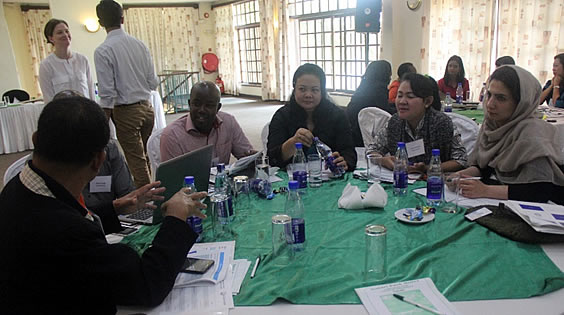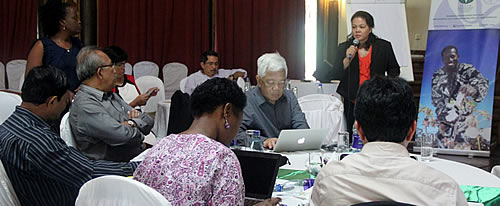 The Biotechnology Leadership Course shared communication and campaign strategies and introduced Cornell University’s Alliance for Science which was described as “a global coalition of scientists, farmers, NGOs, and humanitarian organizations uniting to add a stronger voice for science and depolarize the charged debate around agri-biotech.” The course tackled strategies such as capacity building and how it could be applied to promote agri-biotechnology acceptance among the public. Breakout sessions and exercises on strategic planning and campaign tactics were held. The training was attended by members of two international networks focused on knowledge sharing and education on agri-biotech: the ISAAA Network of Biotechnology Information Centers (BICs) and Open Forum on Agricultural Biotechnology in Africa (OFAB).
The Biotechnology Leadership Course shared communication and campaign strategies and introduced Cornell University’s Alliance for Science which was described as “a global coalition of scientists, farmers, NGOs, and humanitarian organizations uniting to add a stronger voice for science and depolarize the charged debate around agri-biotech.” The course tackled strategies such as capacity building and how it could be applied to promote agri-biotechnology acceptance among the public. Breakout sessions and exercises on strategic planning and campaign tactics were held. The training was attended by members of two international networks focused on knowledge sharing and education on agri-biotech: the ISAAA Network of Biotechnology Information Centers (BICs) and Open Forum on Agricultural Biotechnology in Africa (OFAB).
Meanwhile, the International Conference centered on the theme “Agri-biotech communications and evolving trends” and addressed several points on biotech communication practices in different countries such as the approaches being used, the commonalities and areas of cooperation, effectiveness of different communication strategies, kinds of messages developed and how they are packaged, and their contribution to adoption of agricultural biotech in different countries. Experts on biotech and biosafety communications from across the world including ISAAA Knowledge Center Director Dr. Mariechel Navarro, journalist and former anti-biotech activist Mark Lynas, Executive Director of Malaysian Biotechnology Information Center Dr. Mahaletchumy Arujanan, and Director of Cornell Alliance for Science Sarah Davidson Evanega, among others, presented lessons and experiences on stakeholder information needs, agri-biotech communication impacts, the use of new media and campaigns, and the evolving nature of “balance” and “evidence” in the field to more than 150 delegates from 30 countries in Asia, Africa, America, Latin America, and Europe.
A marketplace for biotech and biosafety information products and materials of SEARCA BIC and other partners and delegates was also set up during the conference.

One of the highlights of the conference was the launch of ISAAA’s new Brief 50, “Voices and Views: Why Biotech?” where SEARCA BIC Special Projects Coordinator Ms. Maria Monina Cecilia A. Villena and Project Associate Sophia M. Mercado served as contributors of essays about Filipino biotech champions Dr. Emiliana Bernardo and Dr. Nina Gloriani.
The conference was spearheaded by ISAAA AfriCenter in partnership with the Kenyan National Commission for Science, Technology and Innovation; the National Biosafety Authority; ISAAA; OFAB; the African Agricultural Technology Foundation; the International Food Information Council; Michigan State University; Program for Biosafety Systems; the Cornell Alliance for Science; the Biosciences for Farming in Africa; and the African Biosafety Network of Expertise.
 Meanwhile, 29 officers and members of ISAAA’s AmeriCenter, AfriCenter, SEAsia Center, and Knowledge Center, as well as its network of Biotechnology Information Centers from Burkina Faso, East and Central Africa, Egypt, India, Indonesia, Iran, Malaysia, Pakistan, Philippines, and Uganda brainstormed and discussed on how to improve communication strategies to enable an accepting environment for the advancement of crop biotechnology in their respective countries during the ISAAA Annual Network Meeting. The BICs also presented their signature activities in 2014 such as SEARCA BIC’s public dialogues on Bt eggplant and the National Biotech Week, Indonesia BIC’s social media biotech campaign, and Malaysia BIC’s Petri Dish newspaper. The group was also briefed on the status of agricultural biotechnology and biosafety research, policies, education and communication initiatives, and public awareness in East and Central African countries by Senior Assistant Director of Research at the State Department of Science and Technology of Kenya Dr. Roy Mugiira.
Meanwhile, 29 officers and members of ISAAA’s AmeriCenter, AfriCenter, SEAsia Center, and Knowledge Center, as well as its network of Biotechnology Information Centers from Burkina Faso, East and Central Africa, Egypt, India, Indonesia, Iran, Malaysia, Pakistan, Philippines, and Uganda brainstormed and discussed on how to improve communication strategies to enable an accepting environment for the advancement of crop biotechnology in their respective countries during the ISAAA Annual Network Meeting. The BICs also presented their signature activities in 2014 such as SEARCA BIC’s public dialogues on Bt eggplant and the National Biotech Week, Indonesia BIC’s social media biotech campaign, and Malaysia BIC’s Petri Dish newspaper. The group was also briefed on the status of agricultural biotechnology and biosafety research, policies, education and communication initiatives, and public awareness in East and Central African countries by Senior Assistant Director of Research at the State Department of Science and Technology of Kenya Dr. Roy Mugiira.
After the meeting, the BIC and OFAB groups also visited the Maize Lethal Necrosis Screening Facility for Africa in Naivasha and were briefed on the research activities there by International Maize and Wheat Improvement Center (CIMMYT) molecular breeder Dr. Manje Gowda.
The BIC is a special collaborative project of SEARCA and ISAAA. SEARCA BIC promotes biotechnology through sharing science-based and accurate information to key stakeholders. Visit SEARCA BIC’s website at www.bic.searca.org or send an e-mail to for more information on biotechnology developments in the Philippines and in the Southeast Asian region. (Sophia Mercado)